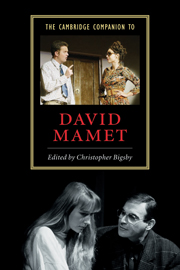Book contents
2 - The 1970s
Published online by Cambridge University Press: 28 May 2006
Summary
When David Mamet began writing, the urgencies of the 1960s seemed to have been put to one side. The protest over Vietnam was abating. The radical experiments of Off and Off Off Broadway, which had seen the emergence of a new generation of young writers and the development of a number of theatre companies emphasizing the actor over the writer and improvisation over the text, seemed to have run their course. There appeared to be a move from the public to the private realm. Those who had made their reputations before the 1960s had largely fallen silent. The theatre itself, which had provided a ruling metaphor for a decade fascinated by the performing self, no longer seemed on the cutting edge of social, political, or aesthetic concerns, even if the opening of new theatres across America suggested a counter-current. It is true that the women's movement was having its effect and that women writers were beginning to be heard but there was no sense, as yet, that drama would play an important role in this.
The exception to what was beginning to seem like the marginalization of theatre, perhaps, was the growing recognition of Sam Shepard, who, in 1970, opened Operation Sidewinder, while out in the mid-west the importance of Chicago as a theatrical center was an increasingly badly kept secret.
This was the world, this the theatre, into which a new young writer emerged. Raised in Chicago, but educated, as far as university was concerned, in Vermont, he had watched the improvisational comedy at Chicago’s Second City and was an admirer of Beckett and Pinter. Briefly a child actor, he confessedly spent most of his university years in and around the theatre department, before teaching theatre and trying his hand at writing scenes for his acting classes.
- Type
- Chapter
- Information
- The Cambridge Companion to David Mamet , pp. 41 - 56Publisher: Cambridge University PressPrint publication year: 2004

